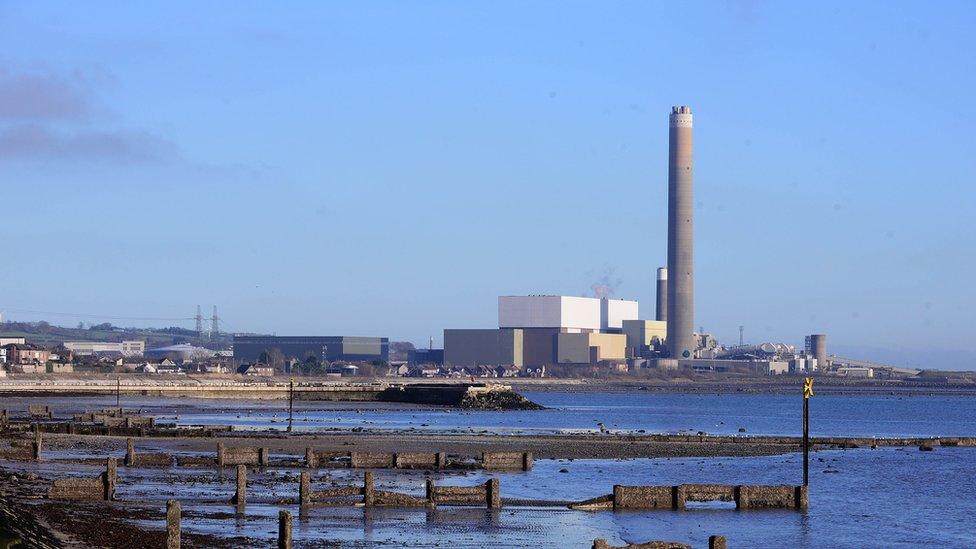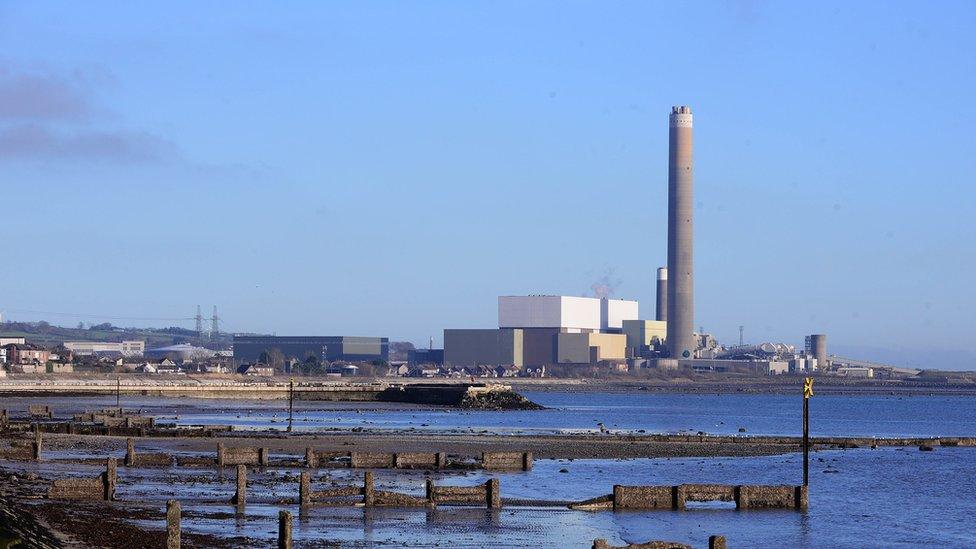Fuel: Call for clarity on power stations' red diesel stocks
- Published

There has been a call to clarify what will happen to stocks of red diesel held by some of NI's power stations when rules on the fuel change in 2022.
The economy minister has suggested that thousands of tonnes of the fuel will need to be burnt off before 1 April.
But UUP economy spokesman Mike Nesbitt said the government previously suggested that such a move would not be necessary.
He said the situation "needs to be clarified as a matter of urgency".
Red diesel is taxed at a lower rate than regular "white" diesel and is mainly used in agricultural machinery.
Rules that further tighten up its use come into effect next year.
Kilroot and Ballylumford power stations have a historical licence obligation to maintain back up stocks of red diesel as part of fuel security requirements.
The new rules requires the disposal of all existing red diesel stocks before 1 April.
On Monday, Economy Minister Gordon Lyons told the assembly that will result in Ballylumford and Kilroot burning existing stocks of red diesel in advance of the deadline to completely purge and clean storage tanks so that they can accept white diesel.

UUP MLA Mike Nesbitt said clarity on the matter was urgent
He added: "There are significant additional costs to replace red diesel. I have been in correspondence on that, but no exemptions have been secured for Northern Ireland at this point."
However Mr Nesbitt pointed to comments from government minister Lord Agnew earlier this year.
In June, he told the House of Lords the government decided to give HMRC discretion in some cases.
He said: "The government recognise that for some users, such as those who need red diesel for back-up power generation in case of emergencies but may use it only for a few hours a year, their last purchase of red diesel may be some time before the tax change."
Mr Nesbitt said that Mr Lyons' view was at odds with that and would mean 30,000 tonnes of red diesel being burnt off and causing "unnecessary pollution".
'No direct policy responsibility'
A spokesperson for the Department for the Economy said that "the matter raised by Mr Nesbitt is an issue of taxation which is not devolved".
"No executive minister has direct policy responsibility for this issue or its impact in NI.
"The minister has written to the UK government about the impact on local electricity generation and a reply is expected imminently.
"However it is important to correct the record. Burning oil at Kilroot, rather than the primary fuel coal, is unlikely to increase carbon emissions.
"Secondly, as a secondary fuel, it is not anticipated that switching between a secondary or primary fuel will lead to any issues of security of supply."
Households in Northern Ireland have been warned that they could face an extra £400 on top of already spiralling energy bills.
It comes as a result of conditions imposed on the burning of coal at Kilroot power station.
The owners of the County Antrim plant have called on changes to regulations in order for them to source coal outside of Russia.
Energy firm EPUKI said much of its coal was sourced from Russia.
This could have an impact on its operations at Kilroot with a potential risk to the security of power supply, they said.
It has called for changes to its operating permit, which would allow it to source coal from other countries.
If that does not happen and it cannot fully operate its coal-burning facilities, it has warned that each customer in Northern Ireland could face hundreds of pounds on top of their annual energy bills.
In a statement, EPUKI said there were significant stock levels of coal on the Kilroot site at present.
"We have contingency plans in place for alternative sources of coal supply. This plan requires changing EP Kilroot's permit which currently prevents us from using coals from other countries," it said.
''Since the start of the Ukraine crisis, EP Kilroot has chaired a number of roundtable workshops with officials from the Department for Economy, Northern Ireland Environment Agency, the Utility Regulator and SONI to urgently address the issues of the current permitting arrangements to enable EP Kilroot to remove its reliance on Russian coal.
''If the permitting arrangements are not changed, we believe there will be significant security of supply risks that SONI will need to manage. In addition, we are concerned that Northern Ireland consumers will be exposed to significant additional costs in the region of up to £400 per customer per year, depending on the extent to which the coal units are restricted from running.
''We are hopeful that this permitting issue can be resolved very soon.''
Related topics
- Published9 July 2020
